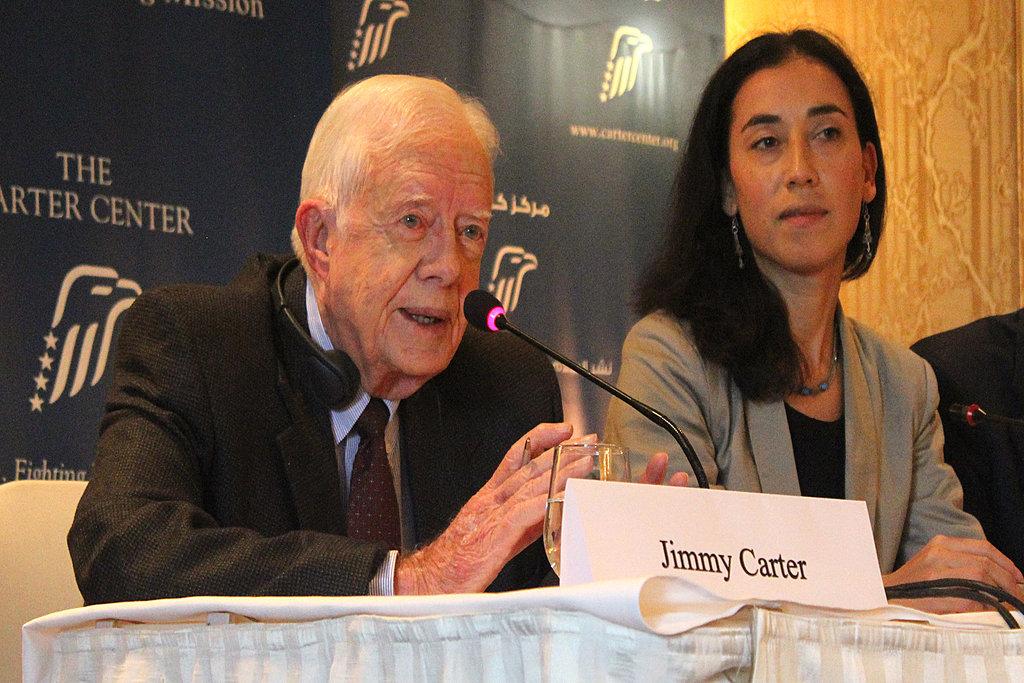Carter still skeptical of Egypt military handover
Former US President Jimmy Carter speaks about Egypt’s recent parliamentary elections in Cairo on Jan. 13, 2012.
CAIRO — Former US President Jimmy Carter grew exasperated at a press conference in Cairo Friday, asked repeatedly about his comments to the New York Times earlier this week that Egypt’s military was unlikely to hand control of the country to a civilian government.
“If I get another identical question, I’m not going to answer it,” he sighed.
The Supreme Council of the Armed Forces (SCAF) issued a statement refuting Carter's opinion on Thursday, pledging again to yield power to elected civilians by June 30. Carter was pressed to square his earlier impressions of SCAF’s intentions with its new statement.
He stood by his comments but said he accepted “with equanimity” the military’s clarification. He also expressed satisfaction with the conduct of Egypt’s first parliamentary elections since last year’s revolution and the first free elections in decades.
“The will of the people has been adequately and accurately expressed in the results of the election,” Carter declared. “The democratic future of Egypt is going to be completely in the hands of the Egyptian people who participate in the democratic process.”
Carter arrived in Egypt on Monday to join 40 “witnesses” from his Atlanta-based Carter Center for the runoffs of the third and final round of voting. The delegation, one of the few groups permitted by the Egyptian government to monitor the elections, has observed the multi-stage process since it began in late November.
On Dec. 29, Egyptian security forces raided the offices of 10 pro-democracy and human rights NGOs, drawing international concern about SCAF’s role in a democratic Egypt following a series of bloody crackdowns on demonstrators.
In addition to paying visits to polling and counting centers earlier in the week, Carter has met with a range of political and civil society figures, including head of the ruling Supreme Council of the Armed Forces (SCAF) Field Marshal Mohamed Hussein Tantawi, Prime Minster Kamal Ganzouri, and representatives from 11 political parties — among them the Muslim Brotherhood’s Freedom and Justice Party, which is poised to claim nearly half the seats in parliament, and the more radical Salafist Al-Nour Party, which is expected to take about 20 percent.
Summarizing the findings of the delegation, Carter noted irregularities but characterized the elections as a success. Candidates representing a diversity of views participated, and voting generally took place free of interference and intimidation.
His assessment echoed those of most domestic and international observers, who have hailed the elections as Egypt’s freest and fairest in recent memory. In a country where, by some estimates, less than 10 percent of the population turned out for sham elections under Hosni Mubarak, average turnouts of over 60 percent have come as a welcome surprise.
The elections haven’t been without incident. Some 900 complaints have been filed with the High Judicial Elections Commission (HJEC), most revolving around illegal politicking outside polling places and the use of religious slogans. On Monday, the Free Egyptians Party, a liberal party co-founded by telecommunications tycoon Naguib Sawiris, announced it would boycott the upcoming Shura Council elections for the largely ceremonial upper house of parliament. The FEP, a member of the liberal Egyptian Bloc coalition, cited the chief prosecutor’s failure to investigate the almost 500 complaints it has lodged.
Other complaints have alleged voter intimidation, ballot tampering, and collusion between the military and certain political parties. Carter acknowledged several of these problems, pointing in addition to the chaotic, uncoordinated manner in which much of the voting was held. However, Carter insisted, his team had found no evidence that the irregularities favored any particular group.
In a preliminary summary of its findings released at the press conference, the Carter Center issued a series of recommendations to improve upcoming elections. They include clarifying the procedures surrounding complaints, better training officials at polling sites, and enforcing campaign finance laws.
The Carter Center will be observing Shura Council elections in late January and early February. Carter added that he hopes to receive accreditation for the spring referendum on the draft constitution and the June presidential election as well.
The story you just read is accessible and free to all because thousands of listeners and readers contribute to our nonprofit newsroom. We go deep to bring you the human-centered international reporting that you know you can trust. To do this work and to do it well, we rely on the support of our listeners. If you appreciated our coverage this year, if there was a story that made you pause or a song that moved you, would you consider making a gift to sustain our work through 2024 and beyond?
